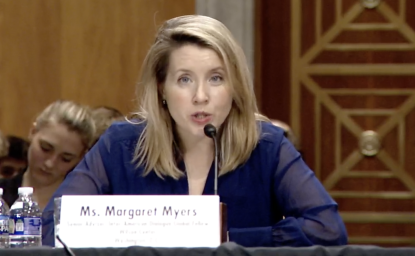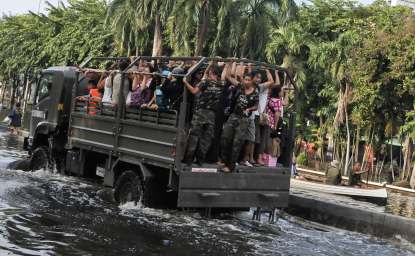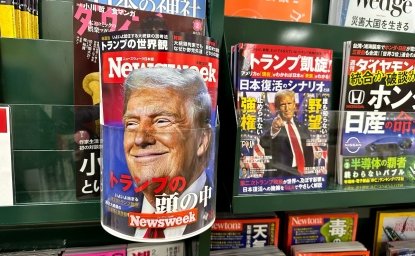The Foreign Policy Research Institute (E-Notes) has recently circulated the following brief essay by Robert M. Hathaway.
Robert M. Hathaway is director of the Asia Program at the Woodrow Wilson International Center for Scholars. He served for twelve years on the staff of the House Foreign Affairs Committee, U.S. House of Representatives. This essay is based on a presentation to FPRI's InterUniversity Study
Group on Asia on April 26, 2005.
The record of the Bush administration in East Asia over the
past four years is a mixed one, but with significant
accomplishments. Nonetheless, nagging problems persist
that, if not adequately addressed, could create considerable
difficulties for the president during his second term.
Finally, George Bush's first term record in East Asia
contains one very substantial failure.
First, the accomplishments: By any reckoning, the
revitalization of the U.S.-Japanese alliance is a major
achievement that is likely to pay dividends long after Bush
vacates the White House. Prime Minister Koizumi has been
one of Bush's strongest backers on the war in Iraq, and has
dispatched Japanese troops to Iraq (albeit, in a non-
combatant, reconstruction role), the first such deployment
into a combat zone since World War II. The new-found warmth
in U.S.- Japanese relations today is all the more notable in
comparison with Washington's strained ties with many of its
traditional European allies
To the surprise of many "China experts," Bush has also
managed the difficult U.S.-China relationship with
considerable success. Candidate Bush campaigned on a
platform ridiculing the Clinton administration for regarding
China as a "strategic partner" and declared that a Bush
administration would shed this naivete and recognize China
for what it was—a "strategic competitor." One has only
to compare Bush's public statement in early 2001 that the
United States would do "whatever it takes" to ensure
Taiwan's security with his unusually pointed warnings to
Taipei more recently about not upsetting the status quo to
see how far Bush—and the U.S.-China relationship—has
traveled over the past four years.
Turning to the Korean peninsula, here the record is rather
less impressive.
Washington's partnership with Seoul needs serious attention
during Bush's second term. Polls show that many South
Koreans view the United States as a greater threat to peace
than North Korea. President Roh has even taken to talking
about the South playing the role of "balancer" in the
region.
North Korea represents the one substantial Asian failure in
the administration's record over the past four years. North
Korea's nuclear weapons capabilities today are greater than
when Bush entered office. Even more worrisome is the fact
that there is no mechanism in place to prevent Pyongyang
from the further production of the fissile material
necessary for nuclear weapons. And increased production
only enhances the likelihood that Pyongyang will transfer
dangerous materials or technology to unsavory buyers.
Bush was correct in recognizing that the North Korean
challenge was a multilateral problem. Even so, he has
little to show in the way of results. In truth, the
administration has yet to decide upon a North Korea policy.
It has, in effect, outsourced its North Korea policy to
China, even though Beijing's North Korea agenda is
significantly different than Washington's. Nor has the
vitriolic rhetoric employed by the U.S. president and other
senior officials been helpful either in persuading Pyongyang
to negotiate seriously or in reassuring Washington's ally in
Seoul.
Shifting to Southeast Asia, one must of necessity start with
the war on terrorism, since U.S. policy in the region over
the past four years has been driven by that conflict. Of
note is the fact that there have been relatively few acts of
terror against American interests in the region. The vast
majority of the region's Muslims have rejected Islamic
radicalism. Most of the governments in the region have
supported—with varying degrees of enthusiasm—America's
anti-terrorism efforts.
Nonetheless, most Southeast Asians are not yet convinced
this is their fight. More generally, U.S. policy in
Southeast Asia has been essentially one-dimensional—
emphasizing the counter-terrorism agenda almost to the
exclusion of anything else. This preoccupation with
terrorism has promoted an impression among the people of
Southeast Asia that the United States does not really care
about them or their interests, and has given China and India
an opportunity to gain influence in the region at America's
expense.
In Southeast Asia, as in other parts of the world, America's
overall standing has eroded over the past four years.
Southeast Asians question both the wisdom of U.S. policies,
and the benign nature of U.S. intentions. The war in Iraq,
whatever its virtues, has created substantial problems for
the U.S. image in Southeast Asia. More happily, the
administration's response to last December's tsunami has
helped to win friends for the United States in the region.
After a slow start in recognizing the terrible dimensions of
the tragedy, the administration has done an impressive job
in assisting the people of Indonesia and elsewhere
throughout the region to rebuild their shattered lives.
Turning to the unfinished tasks facing George Bush in his
second term, North Korea is, by any reckoning, the most
pressing issue on the president's Asia agenda. There are
increasing signs that the 6-party talks are at a dead end,
and that hopes for negotiating North Korea's nuclear arsenal
away are fruitless. Even were the North to return to the
table, it is not at all clear that either Pyongyang or
Washington is prepared for the genuine give-and-take that
true negotiations entail.
One of the notable surprises of the past four years has been
the Bush administration's lack of urgency in dealing with
the North Korea nuclear problem. Time would not appear to
be on our side. Each passing week gives Pyongyang more time
to expand its nuclear arsenal. There are increasing
indications that the North may test a bomb, or engage in
some other provocative act that would heat up tensions in
the region. And worse of all, if the current impasse
continues, the North will be sorely tempted to sell fissile
material—or a complete nuclear weapon—to America's
enemies.
Recently, Secretary of State Condoleezza Rice has heightened
the tone of urgency in her remarks. During her swing
through Asia in March, she spoke of looking at "other
options" should the North not return to 6-party
negotiations. This is empty talk. None of the other
options are attractive; none hold the promise of resolving
the dispute peacefully. The options most frequently
mentioned—taking the issue to the UN Security Council, or
stepping up pressure on Pyongyang—are likely to be
supported by neither China nor South Korea. Washington
continues to dismiss Asian calls for greater U.S.
flexibility in its own negotiating stance. Yet only by
making a good faith effort to negotiate will the United
States obtain the support of its friends in the region for a
tougher approach should, as appears likely, negotiations
fail.
Finally, no one—least of all those in South Korea who are
so vocal on this matter—knows where the insistence on
exclusively peaceful means to resolve this conflict slides
into an implicit acquiescence in a North Korean nuclear
weapons arsenal. Similarly, repeated declarations by the
Bush administration that it "will not accept" a North Korean
nuclear arsenal grow more and more hollow in the face of
overwhelming evidence that Pyongyang not only possesses such
an arsenal, but is systematically enlarging its nuclear
stockpile.
Sino-American relations will also require the president's
continual attention in the months ahead. Claims that
relations between Washington and Beijing are the best they
have ever been are misleading. There is growing impatience
in Washington with China. Conservatives are upset because
Beijing has not delivered on North Korea. Trade and
financial issues roil the relationship, and the Senate is
slated to vote later this summer on a measure enjoying
widespread support that would impose punitive duties on all
Chinese exports to the United States. Beijing's adoption in
March of the anti-secession law has renewed old concerns
about China's intentions toward Taiwan. In truth, this is a
highly fragile relationship whose fundamental problems have
not been tackled, let alone resolved.
Finally, if the United States is to overcome its negative
image in Southeast Asia, the Bush administration must
broaden the American agenda with Islamic Asia, to address
the concerns of the region's mainstream Muslims. Washington
must also pay far more attention to the tone and style of
its policies; it must rely less on the assertion of American
military power and more on genuine consultation,
collaboration, and coalition-building. The administration
must also demonstrate greater sensitivity to the domestic
constraints on the governments of the region, even if this
means being content with less visible help on such issues as
Iraq or maritime security than Washington would prefer.
One hears a great deal these days about the need for more
effective public diplomacy. But not even the most
sophisticated PR effort will help if others find U.S.
policies selfish, immoral, or just plain wrong-headed. U.S.
policy in the Middle East is a particular sore spot for
Asia's Muslim population. Unless Washington is able to
convince Muslims that its Mideast policy is not inimical to
Palestinian aspirations, the United States is unlikely to
win the hearts and minds of Southeast Asia's 250 million
Muslims.
Successful public diplomacy is a long-term project. But
Bush can address another irritant in relations with Asia's
Muslim population overnight: the country's restrictive and
seemingly arbitrary visa and immigration policies. America's
immigration policy is broken. Muslims are convinced that
U.S. immigration policy harbors a deeply held anti-Muslim
prejudice. If remedial action is not taken quickly, the
United States will have missed an opportunity to win
lifelong friends among the next generation of Asian leaders.
Change is afoot in Asia. How George W. Bush responds to,
and shapes, that change will go far to determine his legacy.
More importantly—for both Americans and Asians—it will
help determine whether the twenty-first century escapes or
repeats the unhappy experiences of the twentieth.




